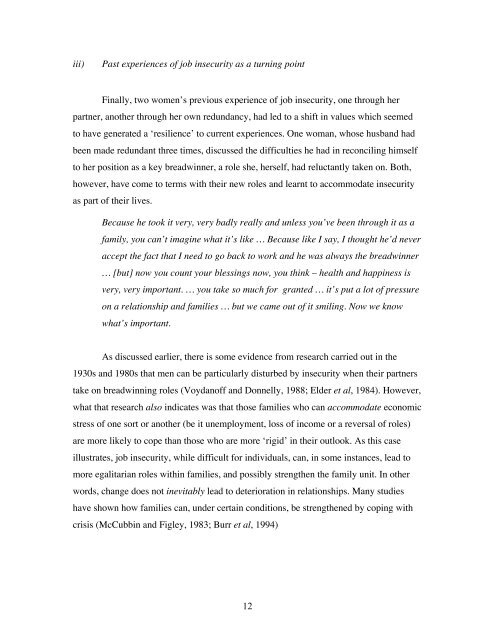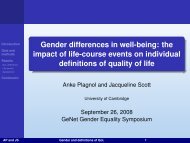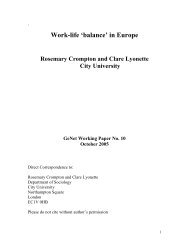Job insecurity, gender and work orientation: an exploratory ... - GeNet
Job insecurity, gender and work orientation: an exploratory ... - GeNet
Job insecurity, gender and work orientation: an exploratory ... - GeNet
You also want an ePaper? Increase the reach of your titles
YUMPU automatically turns print PDFs into web optimized ePapers that Google loves.
iii)<br />
Past experiences of job <strong>insecurity</strong> as a turning point<br />
Finally, two women’s previous experience of job <strong>insecurity</strong>, one through her<br />
partner, <strong>an</strong>other through her own redund<strong>an</strong>cy, had led to a shift in values which seemed<br />
to have generated a ‘resilience’ to current experiences. One wom<strong>an</strong>, whose husb<strong><strong>an</strong>d</strong> had<br />
been made redund<strong>an</strong>t three times, discussed the difficulties he had in reconciling himself<br />
to her position as a key breadwinner, a role she, herself, had reluct<strong>an</strong>tly taken on. Both,<br />
however, have come to terms with their new roles <strong><strong>an</strong>d</strong> learnt to accommodate <strong>insecurity</strong><br />
as part of their lives.<br />
Because he took it very, very badly really <strong><strong>an</strong>d</strong> unless you’ve been through it as a<br />
family, you c<strong>an</strong>’t imagine what it’s like … Because like I say, I thought he’d never<br />
accept the fact that I need to go back to <strong>work</strong> <strong><strong>an</strong>d</strong> he was always the breadwinner<br />
… [but] now you count your blessings now, you think – health <strong><strong>an</strong>d</strong> happiness is<br />
very, very import<strong>an</strong>t. … you take so much for gr<strong>an</strong>ted … it’s put a lot of pressure<br />
on a relationship <strong><strong>an</strong>d</strong> families … but we came out of it smiling. Now we know<br />
what’s import<strong>an</strong>t.<br />
As discussed earlier, there is some evidence from research carried out in the<br />
1930s <strong><strong>an</strong>d</strong> 1980s that men c<strong>an</strong> be particularly disturbed by <strong>insecurity</strong> when their partners<br />
take on breadwinning roles (Voyd<strong>an</strong>off <strong><strong>an</strong>d</strong> Donnelly, 1988; Elder et al, 1984). However,<br />
what that research also indicates was that those families who c<strong>an</strong> accommodate economic<br />
stress of one sort or <strong>an</strong>other (be it unemployment, loss of income or a reversal of roles)<br />
are more likely to cope th<strong>an</strong> those who are more ‘rigid’ in their outlook. As this case<br />
illustrates, job <strong>insecurity</strong>, while difficult for individuals, c<strong>an</strong>, in some inst<strong>an</strong>ces, lead to<br />
more egalitari<strong>an</strong> roles within families, <strong><strong>an</strong>d</strong> possibly strengthen the family unit. In other<br />
words, ch<strong>an</strong>ge does not inevitably lead to deterioration in relationships. M<strong>an</strong>y studies<br />
have shown how families c<strong>an</strong>, under certain conditions, be strengthened by coping with<br />
crisis (McCubbin <strong><strong>an</strong>d</strong> Figley, 1983; Burr et al, 1994)<br />
12






